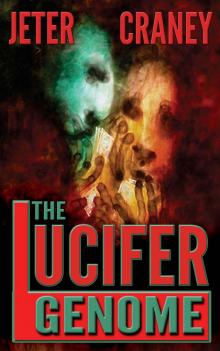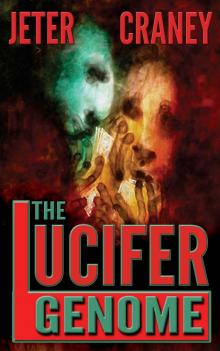- Home
- Glen Craney
The Fire and the Light Page 8
The Fire and the Light Read online
Page 8
“You are the daughter of Count Bernard-Roger of Foix?”
“Yes, but—”
“I knew your mother.”
Esclarmonde tried to arise, but she fell back from dizziness. “Do you know what happened to her?”
Giraude battened the oiled linen coverings over the windows to prevent anyone outside from overhearing. “Your mother and my sister, Blanche of Laurac, were ordained perfectas in this room.”
“You’re a Cathar?”
Giraude examined the necklace at Esclarmonde’s breast and found its talisman. She pulled a stone from the wall and produced a small pyx chest, which when opened revealed an identical medallion. “They are called merels. We wear them to identify those of our faith. The twin riders represent the Rule of Two. Perfectas are attached to travel and live together in pairs. Your mother and my sister were such companions.”
“Then if I find—”
“My sister was burned at Carcassonne.”
Esclarmonde sank with despond. If her mother and this woman’s sister were inseparable, they would have suffered the same end.
“You have been led to me for a purpose,” said Giraude. “What I am about to impart to you must be kept in confidence until the day when another will be brought to you for initiation into the gnosis.”
“How will I know?”
“You will know, as I know now.” Giraude bathed Esclarmonde’s fevered cheeks with the cool cloth. “You have heard of the Magdalene?”
“Mary, the repentant whore?”
Giraude muttered a curse under her breath. “That lie is what the priests wish you to believe. The Magdalene was trained in the temple arts. It was she who initiated Our Lord into the mysteries of the Light. After His death, she and the Master’s brother, the one called James the Just, attempted to preserve the teachings by forming an order of believers known as the Nasoreans. But Saul of Tarsus, the Teacher of Darkness, conspired to alter the arcana and spread falsehoods to the uninformed.”
Esclarmonde had discarded to distant memory her discovery on the night that Folques had accosted her in St. Volusien’s chapel. Now the details of that quest came flooding back to her. “Yes, I’ve heard of this brother.”
“He was exiled from Jerusalem with the Magdalene.”
“Why?”
“He knew the Master Jesus too well.”
“But he is mentioned in the Gospels.”
“The usurpers could not deny James’s existence,” said Giraude. “Too many in Jerusalem remembered him. So they committed a more devious act. They diminished his importance.”
“What happened to the Magdalene?”
“That well outside was blessed by her hand. She and her brother Lazarus—”
“The one raised from the dead?”
“He was in a meditative trance, called back by the Master from his ascent to the Light realms. When the Tarsian imposter purged the Nasoreans, Lazarus fled Jerusalem with his sister and together they found refuge at Marseille. The Magdalene preached the true teachings of the Master throughout Provence. She spent her final years in a cave not far from here.”
“Tell me of these teachings.”
“They are given only when the aspirant is ready.”
“How did you come by them?”
“Before converting to the Christian faith of my father, my mother was raised in a Persian mystery sect called Qadiriyyah. Her people quested for the same sacred emanations that came to you today. The Magdalene studied the mysteries of this Light with the priests in Egypt. She returned to Galilee and Judea to show her Nasorean disciples how to find its salvation.”
“These Arab mystics. Are they connected to your Cathar faith?”
“They are streams that flow from the same river,” said Giraude. “Do not be led astray by names. The true ones of the hidden Church of Love are to be found in all faiths. You must look beyond the outer trappings to sift the essence of the teachings.” She retreated to a closet and returned wearing a white robe gathered at the waist with a red silk sash. She closed her eyes and began turning, slowly at first, then faster. Soon she was whirling with such abandon that she seemed propelled by an invisible force. Esclarmonde thought she saw the faint outline of a halo around Giraude’s head. Had she fallen into the hands of a madwoman?
“This is the door to the Peace that passeth understanding,” said Giraude as she whirled. “When the Sun at Midnight comes to you again, you must not fear it. Dance and merge with it. The Nasoreans called it the Jesus Dance. The Lords of Darkness have long schemed to suppress its power.”
“Why?
“Because it releases us from the chains of our senses.”
Esclarmonde arose from the bed and tried to imitate Giraude’s spinning. Within minutes, her normal thoughts were obliterated by a tingling that ignited at the center of her breastbone. “What is this warmth I feel?”
“It cannot be named,” said Giraude. “Nor sold by a church. The seductions of the flesh impede its gifts.”
“How then am I to describe it?”
“By stories and song, and by the example of your life,” said Giraude. “Did you truly think that the troubadours were only simple-headed minstrels? They spread the secret words that open the heart and channel the Light ... Now, tell me of this man you love.”
Esclarmonde lost her balance, astonished by the woman’s clairvoyance.
“The heart has its own eyes,” said Giraude with a knowing smile.
“He is a Templar.”
Giraude nodded. “Why am I not surprised?”
“He’s nothing like me.”
“I doubt that. Two souls with a common destiny are drawn together on the same ray. Your monk has not revealed to you all he knows.”
“But he hunts down the adherents of your faith.”
“He hunts no mortal prey. The Temple set its headquarters in the bowels of the Jerusalem Temple for good reason. The monks discovered that the secrets of the gnosis were guarded there long ago. If your Templar has the inner sight, he will know that you have been transfigured when next you meet.”
Esclarmonde averted her eyes in shame. “I fear there will not be a next time ... I ordered him never to speak to me again.”
Giraude bolstered Esclarmonde’s flagging spirits with an embrace. “This is your first lesson of the Light. Listen well. Once, a maiden came to her Beloved’s door and knocked. ‘Who is there?’ asked a voice from within. The maiden answered, ‘It is I.’ But the voice replied, ‘There is not enough room here for you and me.’ The distraught maiden retreated to the desert. After spending a year in solitary prayer, she returned to the door and knocked again. ‘Who is there?’ the voice asked again. This time, the maiden replied, ‘It is thyself.’ And the door was opened.”
Esclarmonde felt a surge of joy at the thought that Guilhelm could be her twin soul. But she quickly dismissed the possibility of their being together as man and wife. “He is vowed to God.”
“There are two grades of women in this world,” said Giraude. “There are the many who, by force of past actions, must reincarnate and give physical birth. And then there are the few who are placed on this earth to procreate in another way.”
“What other way is there?”
“The way of the Magdalene, who gave birth to the Light. The Vessel that follows this path must sacrifice its womb to the Higher Wisdom.”
“I’m trying to listen with my heart, but I still don’t understand.”
“Understanding will come,” said Giraude. “Just know for now that, on this day, the seed of a new life has quickened within you.”
Drowsy, Esclarmonde retreated to the bed. As she slipped into a deep sleep, she heard Giraude offer another admonition. “One thing more you must never forget. Every birth requires a sacrifice. It is the Way of the Light.”
Jesus said: “If some say to you, ‘Where have you come from?’ Say to them, ‘We have come from the Light.’”
- The Gospel of Thomas
VII
Pamiers
March 1198
Almaric abstained from all secular pastimes such as falconry and boar spearing, deeming such popular obsessions uncouth for a man of God. But that did not mean he denied himself the thrill of the chase. Come each spring, when the hawking mews were thrown open and the gamekeepers exercised their lymers with loping runs across the greening parks, he would order his black Frisian saddled and his favorite riding habit—expertly tailored with darts and hidden slits to inspire reverence while allowing freedom of movement—brought out from storage.
This morning, the orange Ariege sun was a socket of welcoming warmth, breaking fast above the cornflower-blue lavognes, the small pools that trailed across limestone causses of this alluvial plain like the tears of the Blessed Mother on Calvary. A thousand strands of crystal snow water tinkled down the pleats and rucks of the foothills, rushing from melting caps to placid lakes. The village markets were abuzz with the clanking of hawked wares and the hum of salacious gossip, and from the street stalls came the irresistible aromas of fresh-baked sourdough, roasted asparagus, and spitted turnips—all time-proven baits for the elusive prey that the Abbot stalked this time every year.
Heretic-hunting season had arrived.
This year he had chosen for his base of operations a sleepy burgh situated on a crossroads a few leagues north of Foix. The Occitan town of Pamiers was unremarkable save for one fact: It had long been a notorious haven for the Cathar heresiarch Guilbert de Castres. Because of the degenerate proclivity of its inhabitants, an old keep here called the Clocher des Cordiers—the Tower of Ropes—had been converted into a dank dungeon to incarcerate petty poachers, cutpurses, and heretics who did not warrant the expense of a trial.
Armed with the weapons of his sport—a crucifix, a vial of holy water, and a knapsack stocked with foodstuffs—the Abbot led the reluctant Folques down the Clocher’s occulted stairwell, which corkscrewed into a dripping cavern once used to cure cheese. Escorting the two Cistercians was the establishment’s one-eyed gaoler, whose houndish nose and drooping ears had taken on the features of the vicious Pyrenean mastiffs he bred to sniff out escaping prisoners.
Folques braced his hand against the moss-slimed stones. Assaulted by the stench of rancid flesh, he flashed a torch. A few steps more and he came upon dozens of decomposing bodies that hung from manacles.
The gaoler jingled a half-moon of rusted keys to chase off the cockroaches and rats. “Ye needn’t worry. They’re all shackled.” He emitted a monosyllabic sound that approached a laugh, then added, “Unless they’ve bitten through their limbs.” He kicked one of the prisoners in the hope of drawing a response, but the only sign of life was the scrum of maggots that squirmed under the wretch’s stripped skin. He cursed the dead man for the loss of income. “Devil damn you!”
“Utter another word of profanity in my presence,” warned Almaric, “and you will join them.”
The gaoler spat a black jet of root mash into the cadaver’s face, the only act of protest he dared raise against these haughty Cistercians. Mumbling a litany of his lifelong afflictions, he led the monks deeper into the foetid pit until he saw something move in the far corner. A closer inspection revealed a sunken-eyed ghost of a girl chained at the feet. She blanched into the shadows and hovered next to an emaciated man locked in wrist irons. Clad in filthy rags, the two prisoners blinked painfully from the light. The wall above them was covered with suspicious pagan etchings. The girl shook her head at her cell mate in a warning not to speak.
The gaoler pulled the wasted urchin to her feet to demonstrate that her blackened ankles, rubbed raw by the manacles, would not prevent her from walking out. “Brought in from Foix. Three, four years ago.”
“Their crimes?” asked Folques.
“This li’l quail’s a witch. How else how could she survive?”
Almaric retreated a step. Although protected by the crucifix at his breast, he did not take lightly the power of Satan to channel his sorcery through the female form. After examining the two prisoners, he chose to begin his interrogation with the whimpering man. “Your name?”
The girl rattled her chains in a plea for her comrade to remain silent.
The man was too frightened to obey. “Sacchioni.”
Almaric offered him a cut of salted jerky as an inducement. “We are men of God, my son. You need not be afraid ... Who brought you here?”
Sacchioni chomped down the sliver of meat and retched it up.
“If you confess your sins, we can remove you from this suffering,” said Almaric. “Otherwise, you face an agonizing death.”
Sacchioni rocked nervously on his haunches and tried to avoid the wild-eyed girl’s admonishing glare. He had the queer habit of closing his lids when speaking to the monks. At last, he blurted, “Ten soldiers. Their leader was short. Another one wore a red cross.”
Almaric offered a wineskin to slake the man’s thirst. “Tell me more about the soldier who wore the cross.”
“A strange rood, it was,” mumbled Sacchioni, wine dribbling down his neck. “Like four petals of a flower. And he had a scar—”
“What did you say?” demanded Folques.
Sacchioni’s eyes darted maniacally, fearful that he had declaimed something punishable. “On his face. He had a scar under his eye.”
Montanhagol.
Folques had never forgotten that marred cheek. The Templar must have been ordered to Occitania to search for heretics as penance for his dereliction of duty in the Holy Land. Such an assignment would have been too demeaning for members of his Order in good standing. The Abbot nodded him toward the girl, indicating that she would be his first test in the saving of wayward souls. Folques knelt beside her and held his crucifix before her face. “The blessings of the saints cannot be invoked without your name.” When she persisted in staring blankly beyond him, he flushed with anger. If he could not break this half-starved pigeon, how would he ever subdue the wily Cathar leaders? Imitating the Abbot’s example, he tempted her with a scrap of bread, but she would not weaken. He turned and brought the crumb inches from Sacchioni’s lips.
“Phillipa!” shouted Sacchioni, snapping up his reward.
The girl dropped her head in defeat.
Folques pressed his thumb into the floor grime and marked her flailing forehead with the sign of the Cross. “Phillipa, accept Jesus Christ, who died for your sins.” He began to feel ill. Was she bewitching him? He grasped his crucifix to thwart the demonic spirits and asked the question designed to ferret out suspected heretics. “Do you accept the one God indivisible?”
She muttered incoherent prayers and looked away.
“Answer me, I implore you. For the sake of your soul.”
Almaric could no longer endure this pitiful exercise of ineptitude. He pulled Folques to his feet and pushed him aside. “You have much to learn about dealing with these cloggers.”
“But the Holy Father said—”
“Innocent will discover soon enough the futility of persuasion.” Almaric ordered the gaoler, “Leave us.”
“That’s twenty francs for the two!” Cowed by the Abbot’s baneful glare, the gaoler threw the shackle keys at his feet and skulked away.
Almaric traced his finger along the collar of Phillipa’s tunic, pausing to caress the pale chevron of flesh below her throat. He played with the drawstring on her tunic and slowly untied its knot. She fought wildly and scourged him with the chains, but her struggle only aroused him more. An odd expression, half pain and half rapture, shadowed the Abbot’s face as he unlocked her ankles. She sprang for the gate but stumbled and fell from weakness. He limped after her and came astride her waist, then leaned down and pressed his chest against her frangible body. “If you’re not a heretic, prove it.” He tore open her tunic and groped her breasts. She clawed at him with her long nails, drawing a swash of blood across his stubbled jawline. Heaving from the exertion, he restrained her wrists and shouted with saliva dripping from his mouth, “The witch is revealed to be abhorrent of normal relations!�
�
Folques stood frozen in disbelief.
“Record it!” ordered the panting Almaric, his face crimson with heat.
Folques fumbled for parchment in his pouch.
“You Romans don’t take wives!” screamed Phillipa.
“Satan speaks!” Almaric slapped her against the stones and came atop her again. This time, she did not struggle. He looked down in horror at his white robe—it was splattered with blood. “The Sabine opened her veins on me!”
Sacchioni crouched in the corner. “Am I to be released?”
Reclaiming his pious composure, Almaric arose from the half-conscious girl and smoothed his stained robes. He shook his sleeves to his wrists and wiped his bald head with the meticulous care of a priest about to exit the sacristy to say mass. “Released you shall be, my son ... to the heat of God’s wrath.”
“Not the fires!” Sacchioni crawled screaming in an attempt to catch the departing Cistercians. “There were others! Lasses of privilege.”
Phillipa roused from her stupor. “You took the Last Touch!”
“One of them helped us escape!”
Folques turned at the cell entrance and rushed back to the Cathar man. “These maids. How do you know they were highborn?”
“They wore finery and spoke the court Oc.”
“No!” pleaded Phillipa.
“Father Castres called one of them—”
Phillipa sprang at him. “Don’t sin! You’ll be born again!”
“—the Light of the World.”
Almaric was perplexed by Folques’s stunned reaction. “That means something to you?”
Folques hesitated. “He speaks of the Count of Foix’s sister.”
Almaric broke a fiendish grin. “I’ve sought the arrest of this Castres for years. He appears and vanishes like a spectre.”
Folques raised the whimpering Sacchioni to his feet. “The man who wore the red cross. Did he conspire with the noble maids?”
“I saw him pick up a shred of the dark-haired one’s dress and hide it.”
Almaric mulled the revelation, then shook his head to dismiss its value as evidence. “A tribunal would never believe the ravings of this wretch over the sworn attestations of a viscountess and a Templar. These two are no use to us.”

 The Lucifer Genome
The Lucifer Genome The Twelfth Tribulation: A Short Story of the American Civil War
The Twelfth Tribulation: A Short Story of the American Civil War The Lucifer Genome: A Conspiracy Thriller
The Lucifer Genome: A Conspiracy Thriller The Spider and the Stone: A Novel of Scotland's Black Douglas
The Spider and the Stone: A Novel of Scotland's Black Douglas The Fire and the Light
The Fire and the Light The Twelfth Tribulation
The Twelfth Tribulation